Humanities Essay: Academic Areas, Brockie and Weavers Comparison
VerifiedAdded on 2020/04/15
|6
|1413
|50
Essay
AI Summary
This essay provides a comprehensive overview of the humanities, differentiating it from the sciences, social sciences, and the arts. It defines academic areas and disciplines, offering a detailed comparison of these fields. The essay then analyzes and contrasts the perspectives of Bob Brockie and Lydia Weavers on the value and funding of the humanities, particularly focusing on their views on postmodernism and the relationship between humanities and science. The author argues in favor of Lydia Weavers' more nuanced and contemporary understanding, highlighting her ability to bridge the perceived gap between the humanities and sciences by emphasizing their shared curiosity-driven nature and questioning of established norms. The essay utilizes references to support its arguments, providing a well-rounded analysis of the subject matter.
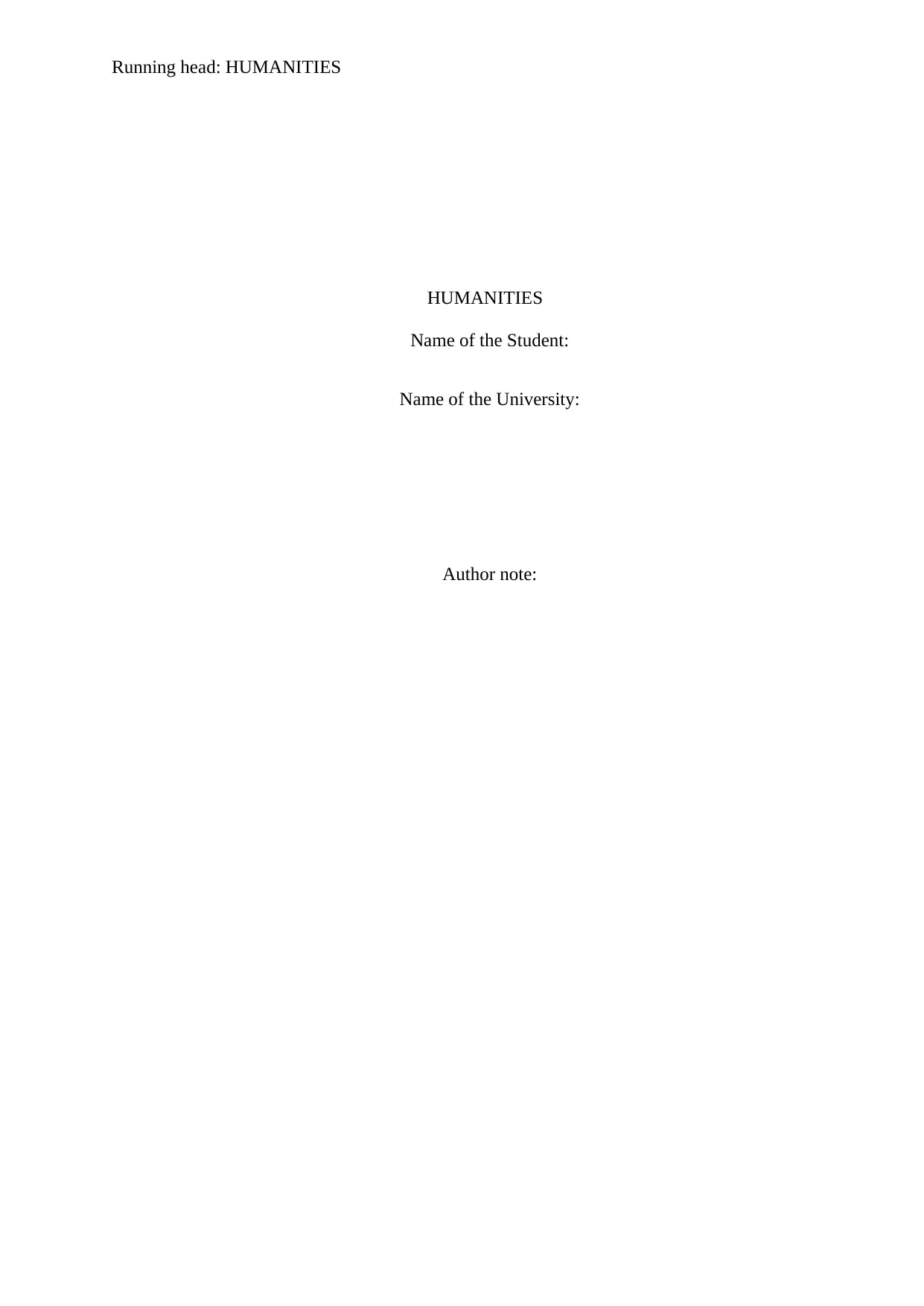
Running head: HUMANITIES
HUMANITIES
Name of the Student:
Name of the University:
Author note:
HUMANITIES
Name of the Student:
Name of the University:
Author note:
Paraphrase This Document
Need a fresh take? Get an instant paraphrase of this document with our AI Paraphraser
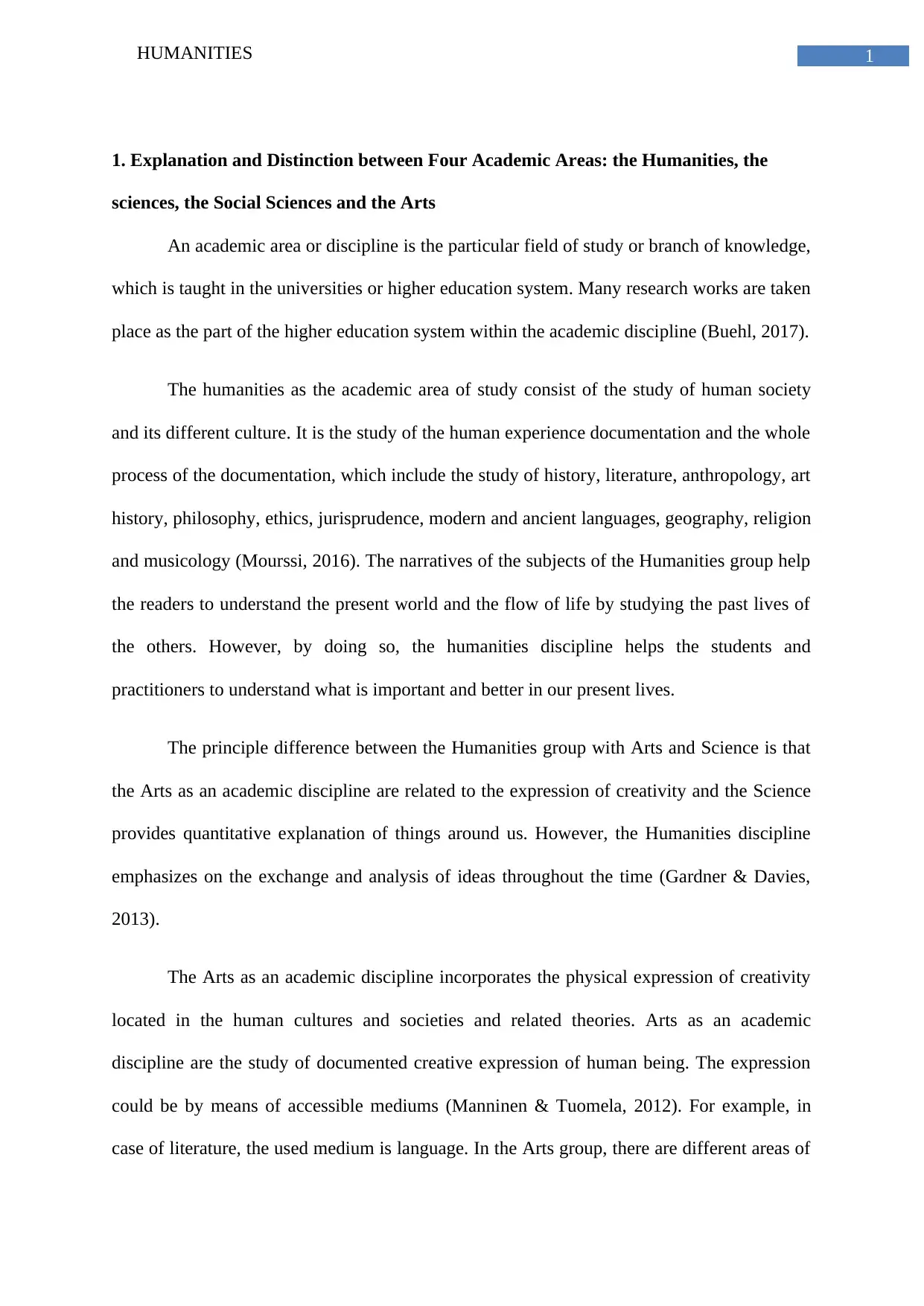
1HUMANITIES
1. Explanation and Distinction between Four Academic Areas: the Humanities, the
sciences, the Social Sciences and the Arts
An academic area or discipline is the particular field of study or branch of knowledge,
which is taught in the universities or higher education system. Many research works are taken
place as the part of the higher education system within the academic discipline (Buehl, 2017).
The humanities as the academic area of study consist of the study of human society
and its different culture. It is the study of the human experience documentation and the whole
process of the documentation, which include the study of history, literature, anthropology, art
history, philosophy, ethics, jurisprudence, modern and ancient languages, geography, religion
and musicology (Mourssi, 2016). The narratives of the subjects of the Humanities group help
the readers to understand the present world and the flow of life by studying the past lives of
the others. However, by doing so, the humanities discipline helps the students and
practitioners to understand what is important and better in our present lives.
The principle difference between the Humanities group with Arts and Science is that
the Arts as an academic discipline are related to the expression of creativity and the Science
provides quantitative explanation of things around us. However, the Humanities discipline
emphasizes on the exchange and analysis of ideas throughout the time (Gardner & Davies,
2013).
The Arts as an academic discipline incorporates the physical expression of creativity
located in the human cultures and societies and related theories. Arts as an academic
discipline are the study of documented creative expression of human being. The expression
could be by means of accessible mediums (Manninen & Tuomela, 2012). For example, in
case of literature, the used medium is language. In the Arts group, there are different areas of
1. Explanation and Distinction between Four Academic Areas: the Humanities, the
sciences, the Social Sciences and the Arts
An academic area or discipline is the particular field of study or branch of knowledge,
which is taught in the universities or higher education system. Many research works are taken
place as the part of the higher education system within the academic discipline (Buehl, 2017).
The humanities as the academic area of study consist of the study of human society
and its different culture. It is the study of the human experience documentation and the whole
process of the documentation, which include the study of history, literature, anthropology, art
history, philosophy, ethics, jurisprudence, modern and ancient languages, geography, religion
and musicology (Mourssi, 2016). The narratives of the subjects of the Humanities group help
the readers to understand the present world and the flow of life by studying the past lives of
the others. However, by doing so, the humanities discipline helps the students and
practitioners to understand what is important and better in our present lives.
The principle difference between the Humanities group with Arts and Science is that
the Arts as an academic discipline are related to the expression of creativity and the Science
provides quantitative explanation of things around us. However, the Humanities discipline
emphasizes on the exchange and analysis of ideas throughout the time (Gardner & Davies,
2013).
The Arts as an academic discipline incorporates the physical expression of creativity
located in the human cultures and societies and related theories. Arts as an academic
discipline are the study of documented creative expression of human being. The expression
could be by means of accessible mediums (Manninen & Tuomela, 2012). For example, in
case of literature, the used medium is language. In the Arts group, there are different areas of
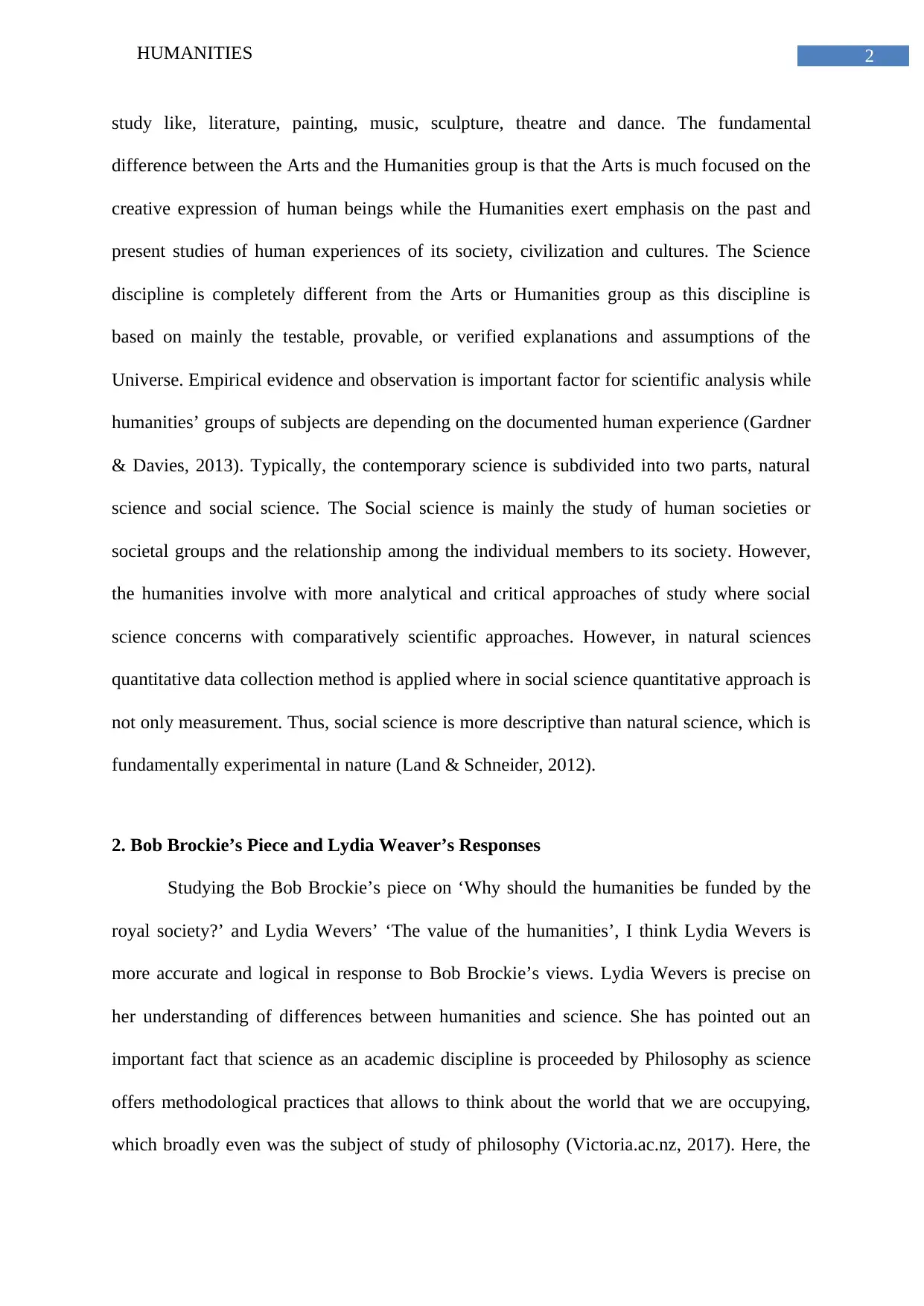
2HUMANITIES
study like, literature, painting, music, sculpture, theatre and dance. The fundamental
difference between the Arts and the Humanities group is that the Arts is much focused on the
creative expression of human beings while the Humanities exert emphasis on the past and
present studies of human experiences of its society, civilization and cultures. The Science
discipline is completely different from the Arts or Humanities group as this discipline is
based on mainly the testable, provable, or verified explanations and assumptions of the
Universe. Empirical evidence and observation is important factor for scientific analysis while
humanities’ groups of subjects are depending on the documented human experience (Gardner
& Davies, 2013). Typically, the contemporary science is subdivided into two parts, natural
science and social science. The Social science is mainly the study of human societies or
societal groups and the relationship among the individual members to its society. However,
the humanities involve with more analytical and critical approaches of study where social
science concerns with comparatively scientific approaches. However, in natural sciences
quantitative data collection method is applied where in social science quantitative approach is
not only measurement. Thus, social science is more descriptive than natural science, which is
fundamentally experimental in nature (Land & Schneider, 2012).
2. Bob Brockie’s Piece and Lydia Weaver’s Responses
Studying the Bob Brockie’s piece on ‘Why should the humanities be funded by the
royal society?’ and Lydia Wevers’ ‘The value of the humanities’, I think Lydia Wevers is
more accurate and logical in response to Bob Brockie’s views. Lydia Wevers is precise on
her understanding of differences between humanities and science. She has pointed out an
important fact that science as an academic discipline is proceeded by Philosophy as science
offers methodological practices that allows to think about the world that we are occupying,
which broadly even was the subject of study of philosophy (Victoria.ac.nz, 2017). Here, the
study like, literature, painting, music, sculpture, theatre and dance. The fundamental
difference between the Arts and the Humanities group is that the Arts is much focused on the
creative expression of human beings while the Humanities exert emphasis on the past and
present studies of human experiences of its society, civilization and cultures. The Science
discipline is completely different from the Arts or Humanities group as this discipline is
based on mainly the testable, provable, or verified explanations and assumptions of the
Universe. Empirical evidence and observation is important factor for scientific analysis while
humanities’ groups of subjects are depending on the documented human experience (Gardner
& Davies, 2013). Typically, the contemporary science is subdivided into two parts, natural
science and social science. The Social science is mainly the study of human societies or
societal groups and the relationship among the individual members to its society. However,
the humanities involve with more analytical and critical approaches of study where social
science concerns with comparatively scientific approaches. However, in natural sciences
quantitative data collection method is applied where in social science quantitative approach is
not only measurement. Thus, social science is more descriptive than natural science, which is
fundamentally experimental in nature (Land & Schneider, 2012).
2. Bob Brockie’s Piece and Lydia Weaver’s Responses
Studying the Bob Brockie’s piece on ‘Why should the humanities be funded by the
royal society?’ and Lydia Wevers’ ‘The value of the humanities’, I think Lydia Wevers is
more accurate and logical in response to Bob Brockie’s views. Lydia Wevers is precise on
her understanding of differences between humanities and science. She has pointed out an
important fact that science as an academic discipline is proceeded by Philosophy as science
offers methodological practices that allows to think about the world that we are occupying,
which broadly even was the subject of study of philosophy (Victoria.ac.nz, 2017). Here, the
⊘ This is a preview!⊘
Do you want full access?
Subscribe today to unlock all pages.

Trusted by 1+ million students worldwide
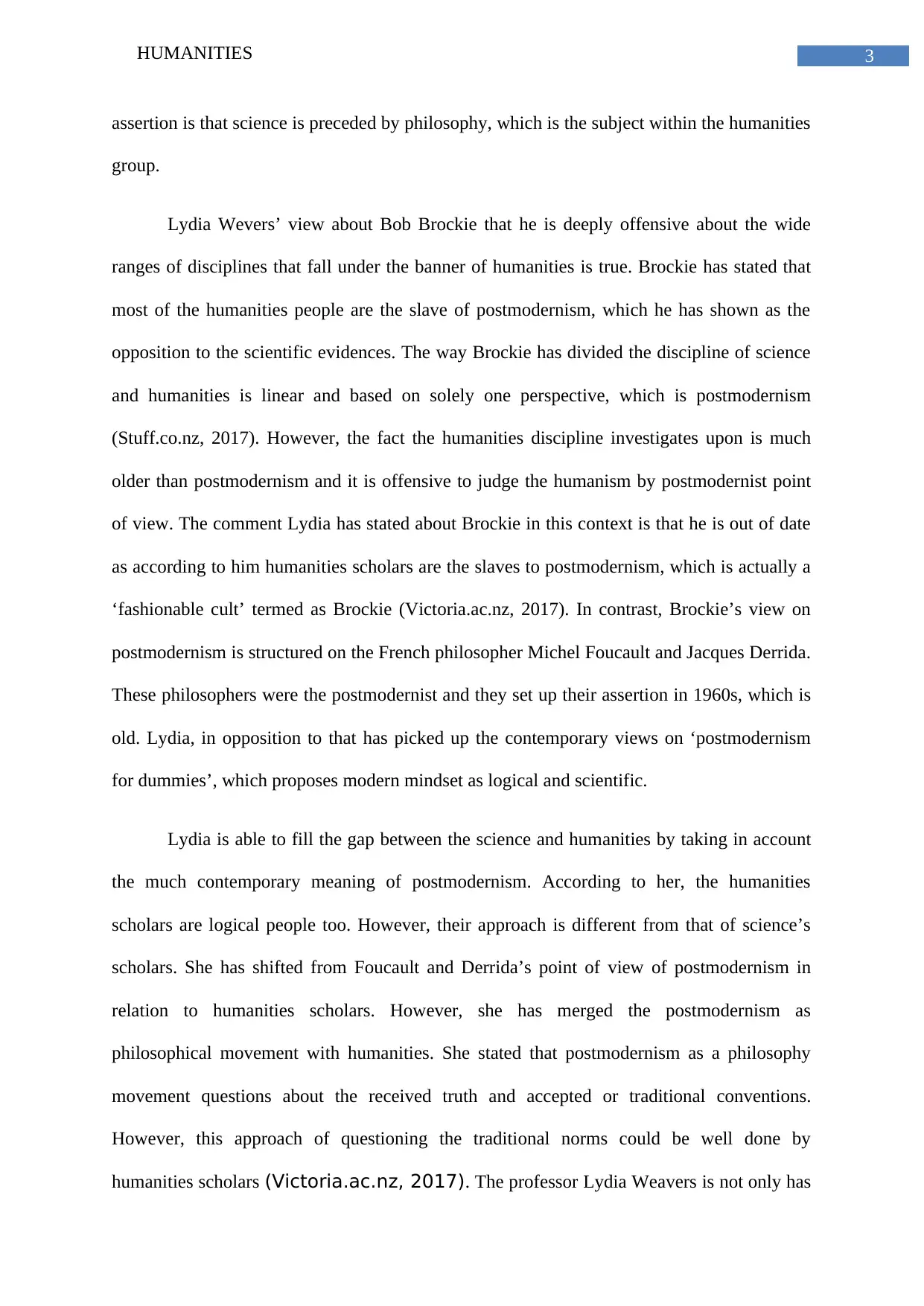
3HUMANITIES
assertion is that science is preceded by philosophy, which is the subject within the humanities
group.
Lydia Wevers’ view about Bob Brockie that he is deeply offensive about the wide
ranges of disciplines that fall under the banner of humanities is true. Brockie has stated that
most of the humanities people are the slave of postmodernism, which he has shown as the
opposition to the scientific evidences. The way Brockie has divided the discipline of science
and humanities is linear and based on solely one perspective, which is postmodernism
(Stuff.co.nz, 2017). However, the fact the humanities discipline investigates upon is much
older than postmodernism and it is offensive to judge the humanism by postmodernist point
of view. The comment Lydia has stated about Brockie in this context is that he is out of date
as according to him humanities scholars are the slaves to postmodernism, which is actually a
‘fashionable cult’ termed as Brockie (Victoria.ac.nz, 2017). In contrast, Brockie’s view on
postmodernism is structured on the French philosopher Michel Foucault and Jacques Derrida.
These philosophers were the postmodernist and they set up their assertion in 1960s, which is
old. Lydia, in opposition to that has picked up the contemporary views on ‘postmodernism
for dummies’, which proposes modern mindset as logical and scientific.
Lydia is able to fill the gap between the science and humanities by taking in account
the much contemporary meaning of postmodernism. According to her, the humanities
scholars are logical people too. However, their approach is different from that of science’s
scholars. She has shifted from Foucault and Derrida’s point of view of postmodernism in
relation to humanities scholars. However, she has merged the postmodernism as
philosophical movement with humanities. She stated that postmodernism as a philosophy
movement questions about the received truth and accepted or traditional conventions.
However, this approach of questioning the traditional norms could be well done by
humanities scholars (Victoria.ac.nz, 2017). The professor Lydia Weavers is not only has
assertion is that science is preceded by philosophy, which is the subject within the humanities
group.
Lydia Wevers’ view about Bob Brockie that he is deeply offensive about the wide
ranges of disciplines that fall under the banner of humanities is true. Brockie has stated that
most of the humanities people are the slave of postmodernism, which he has shown as the
opposition to the scientific evidences. The way Brockie has divided the discipline of science
and humanities is linear and based on solely one perspective, which is postmodernism
(Stuff.co.nz, 2017). However, the fact the humanities discipline investigates upon is much
older than postmodernism and it is offensive to judge the humanism by postmodernist point
of view. The comment Lydia has stated about Brockie in this context is that he is out of date
as according to him humanities scholars are the slaves to postmodernism, which is actually a
‘fashionable cult’ termed as Brockie (Victoria.ac.nz, 2017). In contrast, Brockie’s view on
postmodernism is structured on the French philosopher Michel Foucault and Jacques Derrida.
These philosophers were the postmodernist and they set up their assertion in 1960s, which is
old. Lydia, in opposition to that has picked up the contemporary views on ‘postmodernism
for dummies’, which proposes modern mindset as logical and scientific.
Lydia is able to fill the gap between the science and humanities by taking in account
the much contemporary meaning of postmodernism. According to her, the humanities
scholars are logical people too. However, their approach is different from that of science’s
scholars. She has shifted from Foucault and Derrida’s point of view of postmodernism in
relation to humanities scholars. However, she has merged the postmodernism as
philosophical movement with humanities. She stated that postmodernism as a philosophy
movement questions about the received truth and accepted or traditional conventions.
However, this approach of questioning the traditional norms could be well done by
humanities scholars (Victoria.ac.nz, 2017). The professor Lydia Weavers is not only has
Paraphrase This Document
Need a fresh take? Get an instant paraphrase of this document with our AI Paraphraser
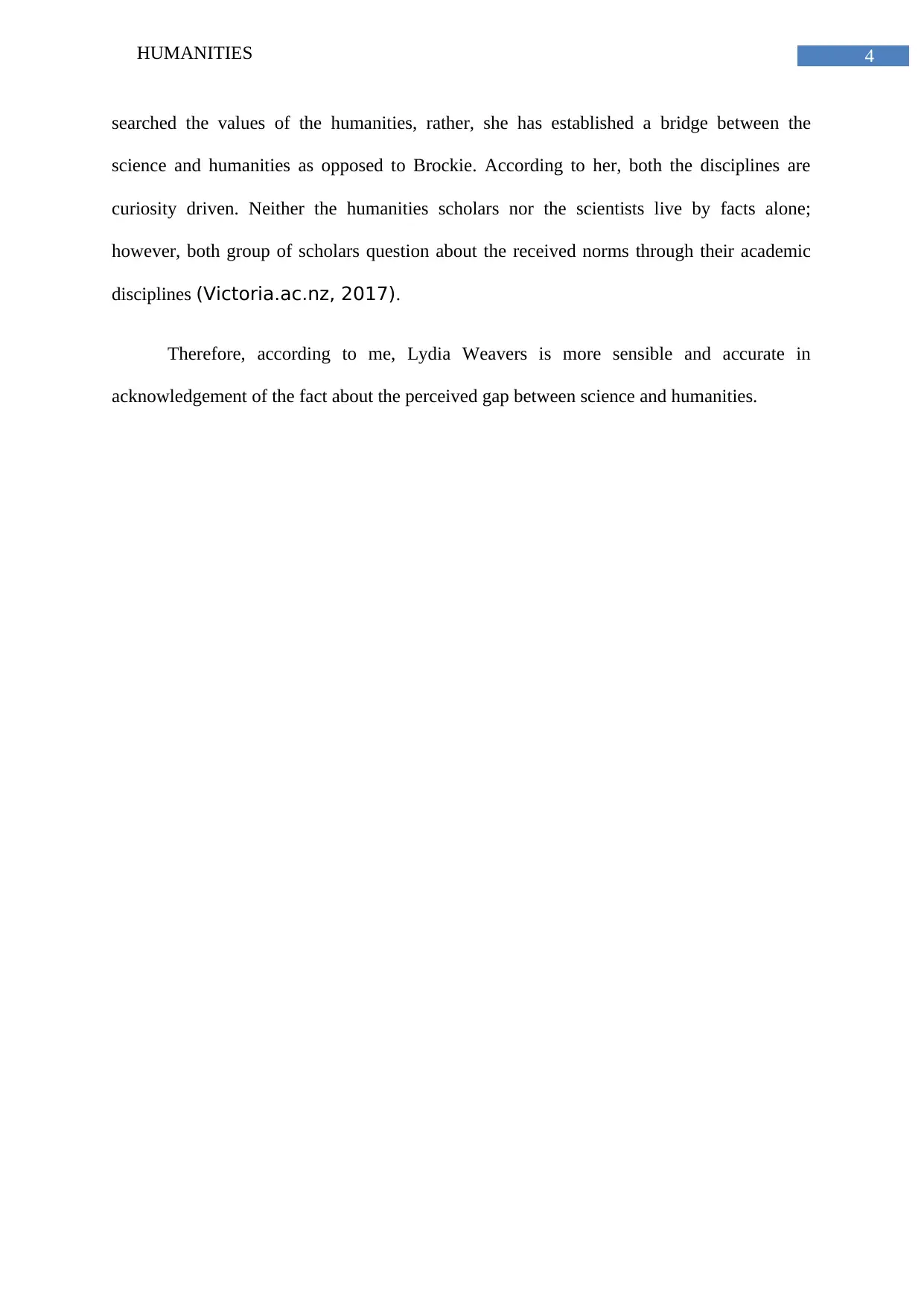
4HUMANITIES
searched the values of the humanities, rather, she has established a bridge between the
science and humanities as opposed to Brockie. According to her, both the disciplines are
curiosity driven. Neither the humanities scholars nor the scientists live by facts alone;
however, both group of scholars question about the received norms through their academic
disciplines (Victoria.ac.nz, 2017).
Therefore, according to me, Lydia Weavers is more sensible and accurate in
acknowledgement of the fact about the perceived gap between science and humanities.
searched the values of the humanities, rather, she has established a bridge between the
science and humanities as opposed to Brockie. According to her, both the disciplines are
curiosity driven. Neither the humanities scholars nor the scientists live by facts alone;
however, both group of scholars question about the received norms through their academic
disciplines (Victoria.ac.nz, 2017).
Therefore, according to me, Lydia Weavers is more sensible and accurate in
acknowledgement of the fact about the perceived gap between science and humanities.
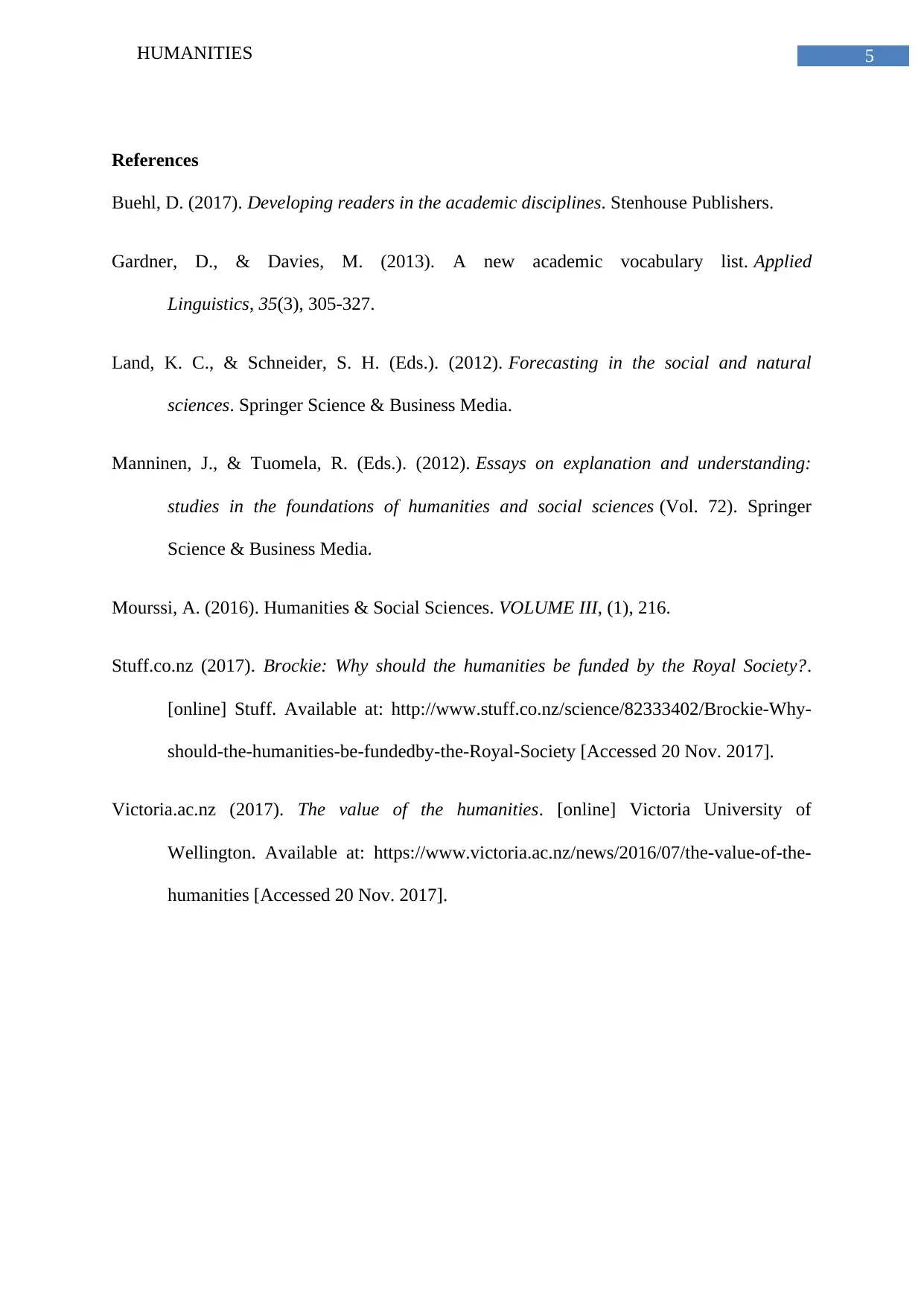
5HUMANITIES
References
Buehl, D. (2017). Developing readers in the academic disciplines. Stenhouse Publishers.
Gardner, D., & Davies, M. (2013). A new academic vocabulary list. Applied
Linguistics, 35(3), 305-327.
Land, K. C., & Schneider, S. H. (Eds.). (2012). Forecasting in the social and natural
sciences. Springer Science & Business Media.
Manninen, J., & Tuomela, R. (Eds.). (2012). Essays on explanation and understanding:
studies in the foundations of humanities and social sciences (Vol. 72). Springer
Science & Business Media.
Mourssi, A. (2016). Humanities & Social Sciences. VOLUME III, (1), 216.
Stuff.co.nz (2017). Brockie: Why should the humanities be funded by the Royal Society?.
[online] Stuff. Available at: http://www.stuff.co.nz/science/82333402/Brockie-Why-
should-the-humanities-be-fundedby-the-Royal-Society [Accessed 20 Nov. 2017].
Victoria.ac.nz (2017). The value of the humanities. [online] Victoria University of
Wellington. Available at: https://www.victoria.ac.nz/news/2016/07/the-value-of-the-
humanities [Accessed 20 Nov. 2017].
References
Buehl, D. (2017). Developing readers in the academic disciplines. Stenhouse Publishers.
Gardner, D., & Davies, M. (2013). A new academic vocabulary list. Applied
Linguistics, 35(3), 305-327.
Land, K. C., & Schneider, S. H. (Eds.). (2012). Forecasting in the social and natural
sciences. Springer Science & Business Media.
Manninen, J., & Tuomela, R. (Eds.). (2012). Essays on explanation and understanding:
studies in the foundations of humanities and social sciences (Vol. 72). Springer
Science & Business Media.
Mourssi, A. (2016). Humanities & Social Sciences. VOLUME III, (1), 216.
Stuff.co.nz (2017). Brockie: Why should the humanities be funded by the Royal Society?.
[online] Stuff. Available at: http://www.stuff.co.nz/science/82333402/Brockie-Why-
should-the-humanities-be-fundedby-the-Royal-Society [Accessed 20 Nov. 2017].
Victoria.ac.nz (2017). The value of the humanities. [online] Victoria University of
Wellington. Available at: https://www.victoria.ac.nz/news/2016/07/the-value-of-the-
humanities [Accessed 20 Nov. 2017].
⊘ This is a preview!⊘
Do you want full access?
Subscribe today to unlock all pages.

Trusted by 1+ million students worldwide
1 out of 6
Related Documents
Your All-in-One AI-Powered Toolkit for Academic Success.
+13062052269
info@desklib.com
Available 24*7 on WhatsApp / Email
![[object Object]](/_next/static/media/star-bottom.7253800d.svg)
Unlock your academic potential
Copyright © 2020–2026 A2Z Services. All Rights Reserved. Developed and managed by ZUCOL.




